 Last month, “Ex-gay” activists held an “ex-gay” pride rally outside the U.S. Supreme Court. Somewhere between seven and 15 people attended, which sounds more like a dinner party than a rally.
Last month, “Ex-gay” activists held an “ex-gay” pride rally outside the U.S. Supreme Court. Somewhere between seven and 15 people attended, which sounds more like a dinner party than a rally.
In any case, Queerty had a chance to chat with the event’s organizer, Christopher Doyle, via cell, after the rally, and then ask him some follow up questions via email.
Doyle is director of Voice of the Voiceless, an organization that claims to assist people who have unwanted same-sex attractions.
You held an “Ex-Gay” pride event in Washington, D.C. that a total of seven people turned out for.
How about we take this to the next level?
Our newsletter is like a refreshing cocktail (or mocktail) of LGBTQ+ entertainment and pop culture, served up with a side of eye-candy.
Actually, we had about 15 people that came.
Okay, so my number was wrong.
By my count, we had about nine former homosexuals, including an ex-transgender, and then we had half a dozen allies that were straight that came out to support us.
Were you disappointed by the turn out?
Somewhat. The numbers were lower than I had expected. I really do believe there are tens of thousands of [“ex-gay”] persons like myself out there. The problem is there really is a lot of intimidation and harassment, unfortunately, by LGBT activists. A good percentage of them don’t give us a fair shake. They really do write some nasty stuff about us. They assume we’re all out there trying to take down LGBT rights.
You’ve said that your plans to host an “ex-gay” pride month were scrapped after receiving violent threats. What were some of these threats and how were they made?
They were over phone and e-mail. Basically after this all was announced in early July, that we were going to hold an event at the Family Research Council (FRC), some people interpreted that to mean that FRC was launching our organization. FRC has made a lot of anti-gay statements. There’s no doubt about it. People who support LGBT rights do not like FRC.
Do you know who made the threats?
The threats that we received over the phone weren’t identifiable. They came from unlisted numbers. Most likely they were people who are sort of unstable.
What did they say?
They would call and say: “You guys are jokes!” “Don’t even try to hold an event in D.C.!” “We’re going to disrupt it!” I can’t quote you word-for-word.
Those hardly sounds like threats.
We take all threats serious, whether explicit or implicit. We thought it best to postpone and move the event to ensure safety and security. Unfortunately, I deleted the voicemails because they were so nasty and I didn’t think about keeping them to save as evidence. I do have some e-mails.
“Fuck you!” “Your beliefs mean shit!” “I hope you all rot in hell!” “You are nothing but an evil hate group!”
This guy photoshopped a photo of my bald head into bowling ball. I replied and told him it’s sad that he’s harassing me because I have alopecia.
How many e-mails did you receive?
I have dozens.
I have trouble seeing how these constitute as “threats,” especially when you compare them to the literally thousands of attacks on LGBT people, including hundreds of murders. I’ve never once heard of any ex-gay bashings.
Attacks towards LGBT persons are a tragedy. It grieves my heart to see such violence. I don’t think you can compare the persecution that gays have faced to ex-gays. This is like comparing apples to oranges. Although, I do know of some instances where my [“ex-gay”] colleagues have been physically assaulted by some angry activists. Ex-gays do face marginalization and discrimination in very similar ways that gays have faced, and I think both are equally wrong.
Did any of the people who threatened you actually show up at your event last week?
We had one activist show up and heckle us. It’s pretty typical. Yeah, we had one activist. This happens all the time, though. One time [after an event] I went out to my car and I had this activist follow me and start taking photos of me and then saying terrible things about me online. I had never even met the guy. And then they started saying things like I’m a “cock sucker” and I’m “still gay.” I’ve never even met these people. They have no idea who I am.
How does it make you feel when people say these things to you?
When I first came public with my story of change, these types of attacks really hurt me. I was shocked that people would say such disrespectful, vile things about another person who they do not even know.
Do you think people get upset with you because of the organizations that you affiliate yourself with? Organizations like the FRC, for instance, that preach a message of intolerance.
Um… I can imagine so. Let me just tell you this: I have tried to reach out to LGBT organizations for support and none of them would offer support. If you think it’s us who are intolerant, I think you need to think a little more about that. We’ve tried to work with HRC and GLSEN. I’ve supported GLSEN’s work, despite the fact that they say negative things about me. I think they do good work around bullying prevention, and wish they were more inclusive and tolerant towards youth who may not identify as gay but have same-sex attraction and may seek change.
But why would an organization like GLSEN ally with people who strive to eviscerate their very existence?
GLSEN has references material that talks about the fluidity of sexuality, but yet when it comes to ex-gays or therapy to help those who want to change, they condemn it. They also have materials and get involved in sexuality education. Should they not be thorough in the information they present to youth who are gay or have same-sex attraction and present all the information? What are they afraid of? Also, does their bullying prevention only cover kids who have wanted same-sex orientation, or also kids who have unwanted same-sex attractions and may desire to change? It seems that there are some political elements going on with their work.
Politics aside, though, these are organizations specifically dedicated to supporting LGBT people, and you say you’re not gay.
We need allies. “Ex-gay” organizations need allies to help support us and our work. If we’re not going to get allies with LGBT organizations who say they’re so tolerant and say they’re so accepting, then who are we to go to? The only places we can go to are pro-family organizations that don’t accept homosexuality.
We are on the fringe. Any time you’re an organization on the fringe, you need to have friendly media outlets and so forth. Can I get onto a mainstream talk show? No. They shut us out. They shut our views out. So where am I to go? American Family Association, Michael Brown, people have taken anti-gay positions.
Do you think they shut you out because they don’t agree with what you have to say…
Absolutely!
 Or do you think it’s because there’s just not much of an audience for it?
Or do you think it’s because there’s just not much of an audience for it?
Maybe with your website. But not the mainstream. Look at every single major television network. Is there a lack of gay voices? You have Anderson Cooper, Ellen DeGeneres, Rosie O’Donnell. There’s no problem with them getting media and airtime, and with that comes influence and power, and they can get their message across. We’re not given that opportunity. We’ve been pummelled by the mainstream media.
So what does it mean to be “ex-gay”?
I think it ultimately comes down to self-identification. I identify myself as an “ex-gay” simply because I want to share my story with other people. People like myself aren’t discriminated against because we’re straight. We’re discriminated against because we’re former homosexuals, meaning we chose a different path, we have a different story than people in the LGBT community. I don’t personally know any ex-gays out there who are really trying to cause hurt among members of the LGBT community. I don’t see that as their motivation. I think they genuinely want to help people.
The road to hell is paved with good intentions.
I’m not out there protesting in front of HRC and saying: “Gays need to change or go to hell.” Although I know some people who do, and they’ve invited me to do those things. And I say “no.” I don’t participate in that stuff. I don’t think it’s my mission as an “ex-gay” to tell people they need to change or they’re going to hell. As a psychotherapist I believe it is my ethical duty to take a neutral stance when it comes to political issues.
That was the other question I had: Do you take issue with LGBT people and LGBT rights? For instance, do you support marriage equality?
I have no issues with gay people, per se. I do have issues with homosexuality and the homosexual activists’ agenda. I don’t personally take a stance on marriage equality, but I am very suspicious of the motives of the organizations that are seeking marriage equality, because in my experience of working with gay men, I don’t see marriage as something they’re interested in.
You don’t?
From what I’ve seen, and I’ve worked with 150 plus clients and have been in the life myself as a former person that acted out on same sex attractions, what I saw was a lot of promiscuity, a lot of multiple partnerships and, really, a lot of sex that didn’t happen in committed relationships. So for me it’s a little puzzling as to why marriage is so important to gay men.
Couldn’t the same argument be made about heterosexual couples, though? I’ve met plenty of heterosexual couples who like to have a lot of sex, who have trouble with commitment, and who fit all the same descriptions that you’re applying to gay men.
For me, it ultimately comes down to an issue of commitment. And I feel the male gay community has a lot of work to do when it comes to commitment. Lesbians are a different issue. I could see them wanting to form marriages because they tend to form longer-term partnerships.
You don’t think that might be a generalization?
That’s what the science says.
I will say this: I’ve come out in public favor of civil unions. I don’t think that gays and lesbians should be denied the right to be in a union.

I guess to me, just listening to that, it seems contradictory to say gay people aren’t interested in commitment and yet they should be allowed to have civil unions. I’m having a difficult time understanding the logic.
From my experience working with and also having gay friends, I don’t see marriage as something that most of them are interested in.
How do you explain people like Alan Chambers, who say they no longer engage in same-sex relationships, but that their sexual orientation never actually changed. In other words, they still have same-sex attractions, they just don’t act upon them.
Alan Chambers would not identify himself as gay. He would say he’s attracted and oriented towards his wife, Leslie. That being said, Alan is not a psychotherapist, nor does he understand the complex nature of sexuality and sexual orientation. As an outside observer of Alan, I would venture to say that Alan has great intimacy with his wife, has attached to her, and they have bonded, which is why he is oriented towards her.
He’s admitted that he’s still sexually attracted to men, though.
Sexual attractions are not about desires, behavior, and arousal. It’s about attachment, intimacy, and bonding. When couples achieve intellectual, emotional, and spiritual intimacy, romantic, or sexual feelings result for one another. That is not to say you can’t be sexually aroused by other people. But successful, committed relationships that are monogamous, which I believe is the ideal, contain those forms of intimacy, which aid and increase sexual intimacy. Unsuccessful and unhealthy relationships tend to focus on sexual pleasure and lust for one another and neglect these other aspects of intimacy.
To clarify: By “unsuccessful and unhealthy relationships” are you talking about “gay relationships”?
Gay or straight.
And you really believe all this?
I firmly believe that if a man who has same-sex attractions can achieve this type of deep intimacy with the opposite sex, when it comes the sexual aspect of their relationship, the “parts”, so to speak, will work. I’ve seen this in some of my clients who were primarily attracted to the same-sex, got married to an opposite sex partner, and because they had great intimacy, had a good sex life.
I read an article you wrote in which you say you’re now married with three kids and haven’t “relapsed” in eight and a half years.
In eight and a half years I have not had a strong desire to act out sexually or really even look at a man and think: “Wow, I’m really sexually attracted to him.” I never really went to therapy to try and eliminate same-sex attraction, it just happened automatically.
There is no data to say that sexual orientation can be changed. In fact, the data says exactly the opposite. So at one point you were sexually attracted to men and then one day it just… stopped?
Yeah! I never bonded with men growing up. I had a hard time with my dad. And I always felt like I was on the outside looking in with men growing up. When I was 23 I moved down to Washington D.C. and started forming friendships with straight men that I felt accepted by and loved by. When I got all those emotional needs met, my same-sex desires and attractions completely went away. I mean, I remember waking up one morning and thinking: “Wow! I’m not attracted to guys anymore.”
How would you respond if one of your children came to you and said: “Dad, I’m gay.”
I would love them unconditionally. Absolutely I would love my child. I would help them discover their truth for their life. I would never kick a kid out because he was gay.
You would never impose heterosexuality on your child or any child if it wasn’t what he naturally felt?
I don’t know. That’s a tough one. I think as parents we impose lots of values on our children. I would say to my child: “I will always love you whether you’re gay or straight, but let me share with you some of the wisdom I’ve learned about sexuality.” I would want them to have all the information. I’m of the belief that the truth will set you free. If being gay is who you believe God wants you to be, then you go and live your life, and you’ll be judged by the Maker. That’s what I believe.
Photo credits: Advocate, Gay Star News, Lisle Boomer.



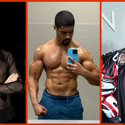






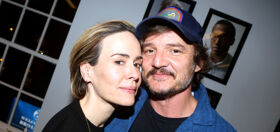
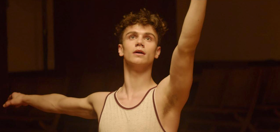



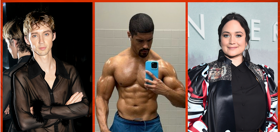
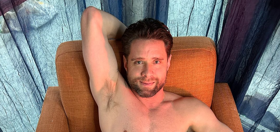
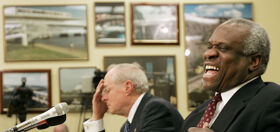


gwydion
I wonder what he thinks about when he masturbates?
Juz sayin…
Allen D.
“really, a lot of sex that didn’t happen in committed relationships.”
Then seriously, dude. You’re doing it wrong. Tsk tsk tsk.
DarkZephyr
This is all a game to men like him. “We need allies”, “gays preach tolerance”, this is just so they can make a big show of how “intolerant” LGBT people are. They know darn well that out and proud gay people will NEVER embrace a movement that tries to say we are broken.
Fael
I do not agree with the beliefs that Chris Doyle, but I was embarrassed by the attitude of this reporter, was very disrespectful during the whole interview
rand503
The last line says it all: If you are gay, God will judge you. And how will he judge you? Be sending you to hell.
For all his talk about psychology and whatnot, it all comes down to Jesus. What a fraud.
hephaestion
Chris Doyle IS gay. And he will be gay until the day he dies.
Stache1
@Fael: Yes confronting him with some truth was absolutely so “embarrassing”. Actually, i wished he really went after him instead of these soft ball questions. Rather have someone like Dan Savage interview him.
Stache1
“Sexual attractions are not about desires, behavior, and arousal.”
Umm…yes they are.
When I was 23 I moved down to Washington D.C. and started forming friendships with straight men that I felt accepted by and loved by. When I got all those emotional needs met, my same-sex desires and attractions completely went away. I mean, I remember waking up one morning and thinking: “Wow! I’m not attracted to guys anymore.”
Wow. I have straight friends myself who accept me as being Gay. I’m not a sappy lame ass like Dolye desperate for straight acceptance though.
“They filled my emotional needs” Who even says this kind of crap? I just can’t believe anyone would want this fool around them.
the other Greg
Ugh. I pity the poor gal he ends up with (for a year or two).
“Sexual attractions are not about desires, behavior, and arousal. It’s about attachment, intimacy, and bonding. When couples achieve intellectual, emotional, and spiritual intimacy, romantic, or sexual feelings result for one another.”
To be fair, I’ve heard plenty of militantly GAY guys say this kind of saccharine dreck. (Some of them being the militantly monogamous types here on Queerty comments.) I never understand it, since it seems to work the other way around for me and most gay guys I’ve known. At any rate, you can have great emotional intimacy, attachment and bonding with a close platonic friend (male or female), no sex necessary!
However, most of us are not in the business of turning our own personal idiosyncratic anecdotal experiences into some grand pseudo-psychological theory applying to everyone, like this guy is.
Jackhoffsky
One wonders if someone has to work THAT hard to eliminate something from their life, what room is there for an actual… life?
I personally find two things offensive (just an opinion): First, that gay relationships are reduced down to “dick in ass”. In (mostly) religious-fueled arguments it is the sexual ACT that is the sin, not the homosexual tendency. The monster of emotional, mental, physical, and spiritual “desires, behavior, and arousal… intimacy, and bonding” are taken out of the mind (where all things sensual originates) and separated from the “dick in ass” final product. I find that offensive… not on a gay level, but on a human level.
Second, I’m personally put off that he has been given a voice on this particular forum. I understand the “know thy enemy” justification, but he brings no new information to the discussion – it’s just the same rhetoric that many homophobic (self-hating or otherwise) have used for years. Even his use of the word “science” and oversimplification of what it means to be of one gender or the other is not only redundant, but as archaic as the concept from which it originated.
the other Greg
@Jackhoffsky: I think it’s hilarious that Doyle got all snooty about his own ally Alan Chambers, of all people, because “Alan is not a psychotherapist, nor does he understand the complex nature of sexuality and sexual orientation.” So what are Doyle’s qualifications???????
And it’s interesting that one reader thought the interviewer was “disrespectful” while another was annoyed at the “soft ball questions.” I think the interviewer struck the right balance: “Give ’em enough rope,” as the Clash put it.
Jackhoffsky
@the other Greg: “snooty” is a very good way of putting that… exchange. LOL.
But Doyle is ‘snooty’ to Chambers without any content. It just was (again) over-generalization marshmallow fluff whipped high with nothing more than his own determined delusion and a lot of air.
It’s almost as if he’s so intent on being poised and correct, he occasionally forgets what he’s suppose to be poised and correct about.
Just my personal opinion.
Dxley
What an ugly ass
Scribe38
@Fael: I feel the total opposite. I wished the reporter went harder on him. There were a few times the reporter could have called B.S. but was fairer to Dolye than most would have been.
acd683
@Fael: You’re totally right (and no. 14 is totally wrong). But this is Queerty, not the Times.
Brian
I think Alan is ex-promiscuity. He’s decided not to act on his same-sex feelings and that’s fine with me.
phillybb
Mr. Doyle surely has drank too much of his own kool aid. Those so called threats he talks about sound as phony as the ex gay crap! If even 10% of what Mr. Doyle says about those so called threats, then he is very thin skinned! Those alleged threats are so fake and sound so harmless, he would not know what to do with real threats! And if being gay is so terrible why not just say you are straight? not ex gay?! There really is no such thing as ex gay anyway.. it is made up and certainly is not a sexual orientation………
Stache1
@phillybb: Because being Ex Gay allows you to carry on as something important and also good for fund raising. If he was simply straight he and his group would just seize to exist ie no one would give a crap.
the other Greg
@Brian: If promiscuity was a problem for him in the past, considering his photo I really think the danger has passed.
Fitz
He is NOT gay. You have to ear gay. He’s just a fagot.
MK Ultra
I actually encourage these people to publicly act out more.
Not only are many of them physically hideous (an obvious reflection of the inner turmoil and stress caused to having to maintain the act of pretending to be someone else all day long),
but their arguments and talking points are so specious.
Only the true believers believe this, and even they really don’t. It’s more like they want to so bad to the point of cognitive dissonance.
I think to most of the public, when they see these weird characters, they see it as a joke, and these ‘ex-gays’ as clowns or circus performers. They appear like people who believe they’ve been abducted by aliens.
Charles175
You know Mr. Doyle, we gays have endured a lot of shit over these many decades. You speak of how mere threats by themselves have kept tens of thousands of people away from your gathering late last June. We have been marching and demonstrating and showing the world who we are over these many decades. This in spite of the fact that we have been attacked, brutally attacked and even murdered so many countless times over the years, we still press forward. We wish that we only had a few threats here and there as you claim you have had. Have any of your people been murdered? Have any your people been brutally attacked? Have any your people been at least barely assaulted? As for myself I have seen the countless many articles about gay people being brutalized and killed. Back in 1985 I was brutally attacked by severely closeted gay man who slashed my throat. The cut missed my jugular vein by less than 1/8 of an inch. His gay panic defense convinced the officers not to even charge him with the crime. They told me that I should be ashamed of myself. On the other hand, I have yet to see even one article of an ex-gay been subjected to any of these things. When you say “sexual attractions are not about desires, behavior, and arousal. It’s about attachment, intimacy, and bonding”. This is a distinct separation between sexual arousal versus being in a basic relationship/friendship with someone. There is a girl in this nursing home that I stay at and I am attached to and am emotionally bonded to her. But I cannot manifest something I do not possess and that is sexual heat for her despite the fact that she is very attractive. I have even told her if I had the power to give up being gay that I would do it just for her but I can’t. We both have a mutual understanding of these things. You also say, “its 8 1/2 years I have not had a strong desire to act out sexually really even look at a man” You’re really saying that you did have some desire but it was not strong. The most absurd statement you made was that you woke up one morning and supposedly you are not attracted to men anymore. Your testimony is full of dual messages going back and forth. There is no real flow of consistency in it. In retrospect I will say this, it is one thing to be dishonest with those around you and it’s another to be dishonest with yourself. Being dishonest with yourself is the worst dishonesty of all.
Luke_James
I want some one to expose the bisexual element in all these so called ex-gays , I believe that most of these people should be correctly called = self hating bi-sexuals who have found ways to ignore there natural same sex attractions .
tdx3fan
Judging from his appearance, on both the outside and the inside, the only thing he has been with in the last eight years is his hands, and they want the number to a good divorce attorney.
Eiswirth
“We chose a different path.” You cannot choose to be straight if your orientation is homosexual, any more than one can choose to be gay. You can choose not to engage in a homosexual relationship, but you’ll never truly be happy because you’re denying your nature. These people are just not able to accept their gayness for any number of reasons, but I will never, ever believe they are now straight.
tdx3fan
He refers to himself as a psychotherapist? From what University is his doctorate from? Also, both the APA and ACA stand in exact oposition to his beliefs, so he is in strong violation of their ethics. Personally, I can not wait till we start pulling licensure from these ex-gay whackos.
tdx3fan
@Brian: It is fine with me as well. What is not fine with me is that he feels the neex to coerce others to do the same. Even worse? He makes them pay him for that coercion. On a side note, the only response to the “as a psychotherapist…” line is “where did you get your doctorate, and what do you think about the APA saying you are not only wrong but harmful and possibly dangerous?”
Kangol
Doyle’s responses curdle with self-hatred, self-denial, and sadness. But this is the life he chose. That’s his business. Just stop working in league with hom•ophobes to make the lives of others hellish.
For centuries children and adults have died because of hom•ophobic people like him and his Family Research Council allies. Be miserable by yourself (God help the woman he’s married to, and his children), but stop working so hard to drag everyone else into your ugly net.
lailaichong
I am ex-straight
tdx3fan
There is no such thing as a licensed psychothrapist. His organization website mentions he has a MA in professional counselling. This is odd because in Washington D.C., anyone with such a degree would be a LPC not a psychotherapist. In short, not that this news to anyone, the dude is a fraud who either has no license or no degred or both. It is possible that he has a “degree” from an uncredited institution. In short, he has as much right to throw around his professional “title” as someone who got a degree in dog shit.
Fitz
@tdx3fan– no, actually several states license psychotherapists.
I live in California, and MFTs or LCSWs can become licensed as psychotherapists, and both are MA level degrees. The MA plus supervised experience makes you eligible for a state exam.
tdx3fan
@Fitz: California is an odd ball. They did not even have an LPC licensure until this year. However, this asshat does not work in California. He works in Washington DC where a degree in counseling means you sit for exams to become an LPC. He has no training in psychology, and has a degree in counseling with out the LPC. The most common reason for this is because since he is not licensed, it is illegal for him to use the term. Washington DC does not license psychotherapists unless they have a doctorate. Which, he does not.
Horse Lips
Who the hell would have sex with him?
james_in_cambridge
@Horse Lips: Exactly! He’s revolting, inside and out!
He’s also very clearly a psychopath. I feel sorry for whoever marries this loser.
Ridpathos
From what he stated, it doesn’t seem to me like he was ever gay to begin with. Just because you want male bonding doesn’t mean you’re sexually attracted to males. From what he states it sounds like he was never sexually attracted to other males, just obsessed with building male relationships because of his own personal issues.
gaym50ish
When asked about the turnout at his ex-gay rally, said he was “somewhat” disappointed, and “The numbers were lower than I had expected.”
Are you kidding me? It was an EMBARRASSING turnout! In their public statements before the event, they had said they expected thousands — as if there really WERE thousands of ex-gays.
Billysees
@gwydion: 1
Cute and realistic question.
tdx3fan
@gaym50ish: They expected thosands… ten ex-gays and a bunch of raging homophobes… However, FRC is having a problem turning out numbers as well, and even leading homophobes in the movement are trying to get out of the way and offer an olive branch; because, they know they are on the losing side.
Chris-MI
Hm, I imagine if I was a scared kid with alopecia totalis (i.e., no hair) and I walked into a gay bar and got told two or three times that I was repulsive I might start looking a the whole ex-gay thing.
the other Greg
@tdx3fan: Oh, I see your problem… you are leaving out the hyphens.
Try spelling it like this:
psycho-the-rapist!
hf2hvit
He may not be gay but he sure is QUEER
Fitz
If he were just some guy who decided that his experiment was over, and
he was going to stick with chicks, I would cut him plenty of slack–
Who the hell am I to tell someone how to do their sex…
The real issue for me is that 1) he has allied himself with people who work to
attack us. 2) He promotes this proven-false idea that you can elect your
sexual orientation– and this is a huge part of the equation that hurts little
queer kids. He is a sick, sad freak who instead of going in the corner to deal with it is dumping it on the doorsteps of gay people who struggle with acceptance.
Scott Rose
The term “ex-gay” has no scientific acceptance, because all it signifies is a homosexual person with internalized homophobia who yaks to the world that he has accepted gay-bashing hate speech as the truth and so is going to pound his chest bragging about how wonderful he is for living the way religious anti-gay bigots say he should live. Actual sexual orientation is determined by actual sexual attraction, not by internalized gay bashing. I can not imagine being the girlfriend or a wife of one of these stinking anti-gay bigots who must constantly advertise that they are “ex gay.” It’s as good as announcing that one is in a sham relationship. Take your filthy, gay-bashing Bible, stick it down your throat and choke on it and then wash it down with Jesus freak Kool-Aid. Empirically we know that homosexuality is a universally occurring, normal human variant. Go jump in a lake with your gay-bashing nonsense. Nobody gives a damn if you want to allege that you no longer feel homosexual desire — we know you’re lying through your teeth out both sides of your gay-bashing mouth.
Pizza
I’m 49 years old and last year went to my HS reunion and met up with a woman I dated and loved dearly in HS. Fast forward to today and we’ve been in a relationship for nearly a year now and I’ve never been more happy. We have no secrets and she totally accepts me. Having to tell my straight friends was like coming out again in reverse. It was difficult for many of my friends to understand and I still haven’t told everyone just because it really is exhausting trying to convince people that I’m not some freak who has lost touch with himself. Am I now straight? No. Is the sex with her good? Yes. Will I ever date other women if this doesn’t work out? Probably not. What I can say is that since we have been together, it’s become obvious to anyone in the same room with the two of us, that we are totally in love and truly adore each other. There are so many people are age that are stuck in dead end, sexless marriages and don’t have the balls to leave. Her divorce becomes final this month after a year of lawyer back and forth BS. I’m not bashing gay people, and she actually has raised her children to be totally accepting of everyone. Sometimes life takes you places you never dreamed. I know there are a bunch of other things about this story that are upsetting and false, but please guys, support people who find love, whatever that may be. – Jeff/Boston
Nixter
@Brian: Why is that fine with you? Would you be fine if a heterosexual male abstained from sex?
Fitz
@Pizza- and you found this article in your heterosexual relationship while reading Queerty together. See you at the Fens.
Billysees
@Fitz: 46
“….and you found this article in your heterosexual relationship while reading Queerty together.
Hehehe…..lol……..cute………
What is “the Fens” ?
Billysees
@gwydion: 1
I wonder what he thinks about when he masturbates?
Juz sayin…
Could have also wondered what kind of porn he enjoys……hehehe….
Billysees
@Fitz: 42
Well said.
Abbreviated, it needs repeating —
” The real issue….is that….
1) he has allied himself with people who work to attack us.
2) He promotes this proven-false idea that you can elect your sexual orientation….
….this is a huge part of the equation that hurts little queer kids.
He is a (selfish, asshole who wants some fame and money from this issue…paren mine)
sick, sad freak who instead of going in the corner to deal with it is dumping it on the
doorsteps of gay people who struggle with acceptance.”
the other Greg
@Billysees: The Fens is a bl0w job park in Boston that a lot of “straight” married guys go to, was Fitz’s point.
DonW
@Pizza: Good for you for finding love, Jeff. Maybe you’ve always been a latent bisexual — who knows, these labels are pretty inadequate. But unlike you, whiny “ex-gay” types like Doyle rarely mention love in any convincing way. They simply blather on about their struggle to avoid engaging in particular physical acts. Doesn’t sound like you have much in common with them.
Pizza
@DonW: DonW – thank you for offering a mature refreshing response. Why do some gay men expect everyone to accept them yet once someone draws outside the lines they think it’s okay to bully you? As I mentioned, I’m not living a lie and there are no secrets, just two people who found love and found a way to make it work. A few years ago I came to realize that even though I am gay, too many gay men, especially in Boston are just assholes. Traveled all over the world and I have to say, Boston is just toxic. Never really went to gay pride, but did this year and it was great to walk through it, holding her hand and finally being with someone who truly loves me and I don’t have to deal with whiny insecure people every again. Just that makes sex fun again too.
dkreuzberg
@fitz -No 46 This is pizzas girlfriend. Why yes, we were reading this together. I just have never understood people being nasty and belittling-whether straight, gay, whatever. Let people live their own lives. No reason to be judgmental or rude. Every human deserves the chance to be happy. Jeff and I have a bond that few people share. You will probably come back with something rude, but its your life. I wouldn’t trade places with anyone in the world. I have the most kind, compassionate, intelligent and fair-minded partner and am incredibly lucky. He’s crazy amazing in bed too.
Nixter
@Pizza: So you’re bisexual. Fine. No prob.
Billysees
@the other Greg: 50
We have a similar place here in my hometown. I haven’t been there in a long time.
Back in the 70’s, 80’s and 90’s, it was the place to go after the bars closed.
I remember it was a mob scene there onetime at 3AM.
Oh….the good old days…..hehehe.
http://www.wymanparkdell.org/
http://baltimoregaylife.com/back-issues/item/515-baltimores-first-lgbt-heritage-walk-shines-light-on-local-history
enlightenone
“From what I’ve seen, and I’ve worked with 150 plus clients and have been in the life myself as a former person that acted out on same sex attractions, what I saw was a lot of promiscuity, a lot of multiple partnerships…”
YOU SEE what you are involved in and doing, “acting out” and being a hoe, rather than being with a self-respecting, affectionate man who embrace’s what and who he is making love and cumming together! These two men then, at some point in their loving relationship, COMMIT to choosing to share this life together, perhaps for the rest of their days.
enlightenone
@Stache1: Other fools of course, about “15-30” of them!
enlightenone
@Jackhoffsky: Your opinion is worth more than all the verbiage of this self-delusional narcissist!
enlightenone
@Charles175: If this rodent had half a ball to your two, this interview may have had some value other than to allow him to say he was interviewed by…. The universe spared your life for a purpose. Continue to live it!
enlightenone
@Nixter: @Pizza: Not sure what you mean by “bullying” you, but this discussion is about the delusional concept of “ex-gay” for 2 seconds of fame and a few dollars in the pocket! I totally accept you being a bisexual who identifies as gay, who had some misfortunes with males/men as you sought to be loved and have sexual satisfaction/ fulfillment. Although, I would say, the possibility/numbers were/are there, since you are bisexual, could have eventually found a man just as you found this woman. For me, since I identify as gay and is a homosexual, I still hope I can find the man like you found the woman because as a homosexual oriented man, a woman wouldn’t do it for me! As a biological father (having had a girlfriend or two in my teen years and married for a hot minute during the gay dark ages) of a wonderful 28 year old, I know this for sure.